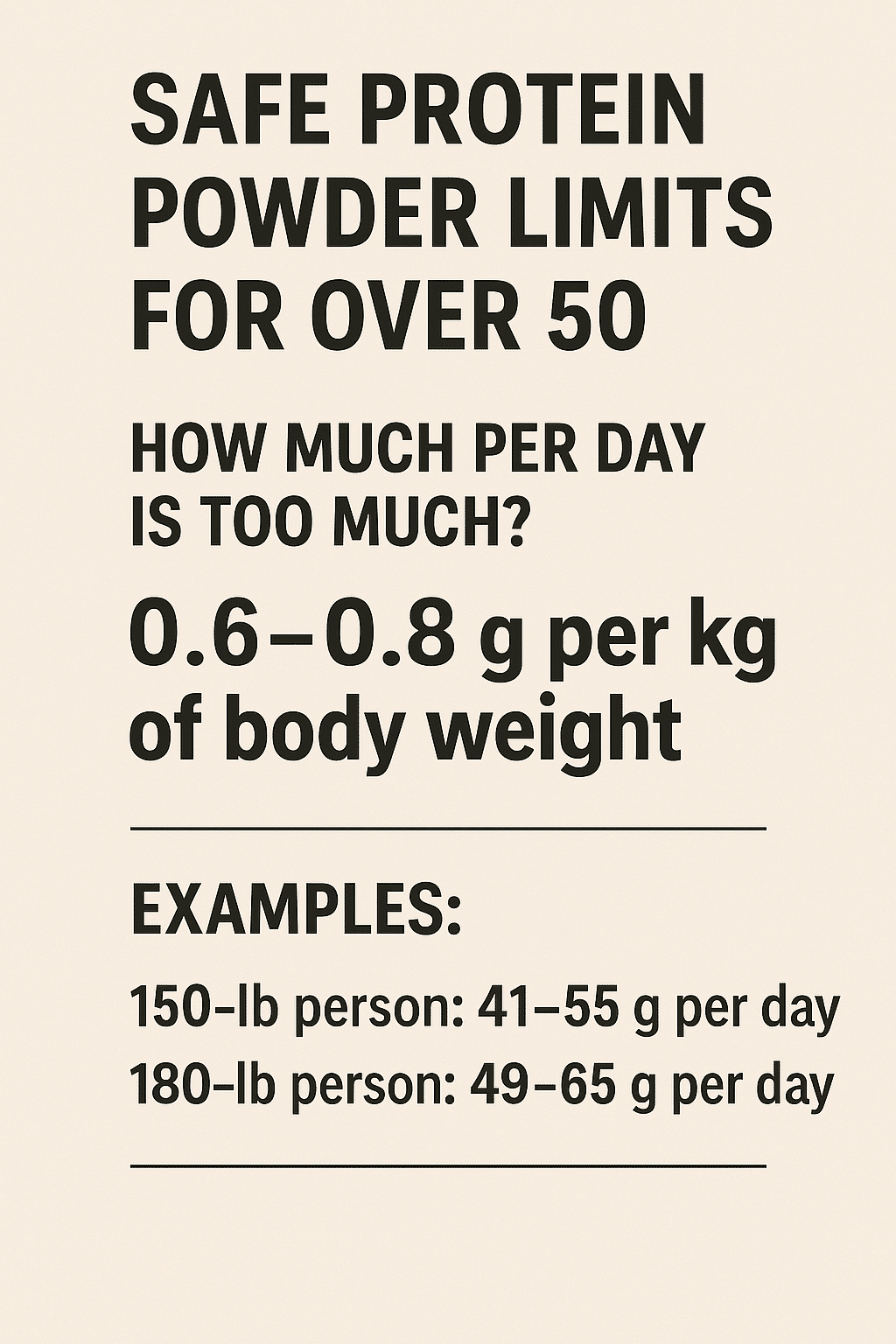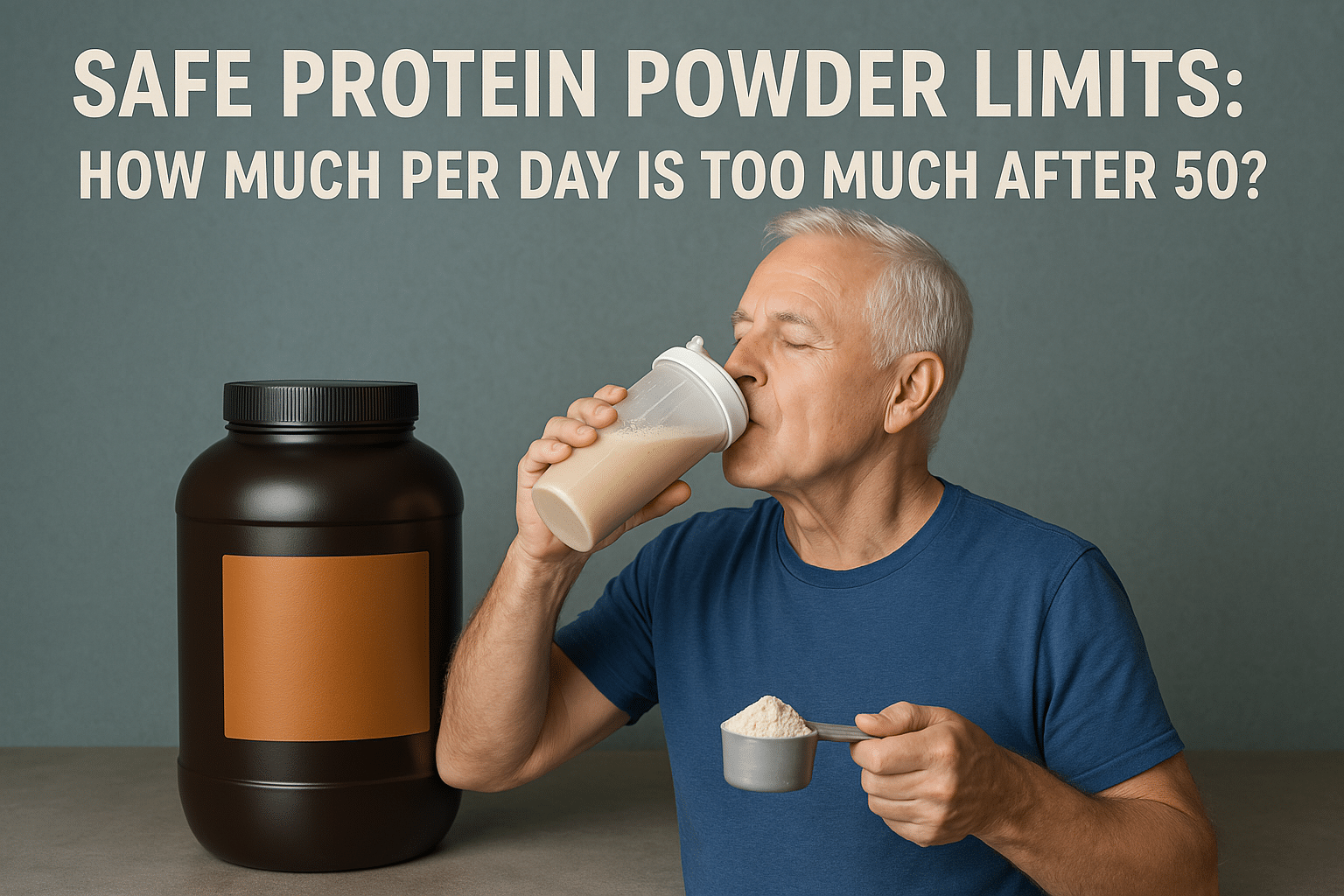Are you wondering how much protein powder is too much? You’re not alone. As protein powders gain popularity, more people over 50 are asking this question.
I’ve researched the latest findings to bring you clear answers about safe protein powder consumption limits.
Table of Contents

If you want to stay strong and active without adding extra size, visit our guide, Best Protein Powders for Seniors Who Don’t Want to Bulk Up. It covers the best low-calorie, clean protein powders to help adults 50+ maintain lean muscle safely.
For personalized guidance on how much protein you need to support muscle gain or fat loss, try our Protein Calculator Pro. It takes into account your weight, activity level, and fitness goals to provide an optimized daily protein target tailored just for you.
Trying to cut out dairy from your diet? See my latest article on Best Protein Powders to Mix with Water!
Is Too Much Protein Powder Dangerous?
The short answer: it depends on your health status.
Most healthy people can safely tolerate up to 1.5 grams of protein per pound of body weight daily with no side effects. This includes protein from both food and supplements.
According to a 2021 study published in Healthline, healthy individuals can process excess protein from food and supplements at levels between 1.14–1.5 grams per pound of body weight per day without adverse effects (Healthline, 2021).
However, the safety depends on several factors:
Protein powders are classified as dietary supplements, which means they aren’t regulated like food or medicine. The FDA leaves it to manufacturers to evaluate safety and labeling, so there’s no guarantee a protein powder contains what manufacturers claim.
Quality matters too. It’s important to choose protein powder that is independently verified. Look for certification from trusted sources like USP or NSF when buying supplements.
Is Any Protein Powder FDA-Approved?
No, the FDA does not approve protein powders before they are sold. Protein powders are considered dietary supplements, and the FDA does not regulate them in the same way as drugs or food. This means manufacturers are responsible for evaluating the safety and labeling of their products, and the FDA primarily monitors for safety concerns after the product is on the market.
Learn more – Read my latest article, What is the Difference Between Complete Proteins vs Incomplete Proteins?
How Much Protein Powder Can You Safely Consume Daily?
For most healthy adults, moderation is key:
Evidence supports consuming 20 to 40 grams of protein at a time (roughly the amount in a can of tuna). Larger quantities simply contribute extra calories and can actually reduce muscle-building potential.
Studies show that higher intakes in one sitting—more than 40 grams—are no more beneficial than consuming the recommended 15-30 grams at one time. According to Mayo Clinic Health System, research indicates that consuming more than 40 grams of protein in a single sitting provides no additional benefits compared to the recommended amount (Mayo Clinic Health System, 2024).
General guidelines for daily protein powder consumption:
- For general health: 1-2 scoops (20-40g) per day
- For active adults: Consider your total protein needs based on weight and activity level
- Upper daily limit: Most research shows healthy people can safely consume up to 1.5 grams of protein per pound of body weight from all sources combined.
Health Effects of Exceeding Protein Powder Limits
Taking too much protein powder isn’t beneficial and may cause:
Digestive distress, especially for those with dairy allergies or lactose intolerance when using milk-based protein powders. Some protein powders can also contain high added sugar and unnecessary calories.
More concerning is potential contamination: A report by the Clean Label Project found many protein powders contained heavy metals, BPA, pesticides, or other contaminants linked to health conditions. In their study of 134 products, one protein powder contained 25 times the allowed limit of BPA (Harvard Health, 2022).
For kidney health, the research shows:
For people without existing health conditions, a high-protein diet is unlikely to damage kidneys. However, people with kidney disease should be cautious about high protein intake as it could further damage the kidneys.
Safe Limits for Different Types of Protein Powders
Not all protein supplements are created equal:
Whey Protein People once thought high protein diets were harmful for bone health, but current research suggests that a high protein diet may actually boost bone health by promoting calcium absorption and supporting skeletal muscle mass.
A long-term study of 280 older men and women consuming 45 grams of whey protein daily for 18 months showed the protein group preserved significantly more muscle mass compared to the placebo group, with no differences in bone composition (Healthline, 2021).
Plant-Based Protein Plant-based powders often have less protein but shouldn’t be discounted. Rice and pea protein have been shown to stimulate muscle growth similar to whey.
According to Harvard Health, research shows rice and pea protein stimulate muscle growth similar to whey protein, making them viable alternatives for those avoiding animal products (Harvard Health, 2020).
How to Calculate Your Personal Protein Powder Limit
To find your ideal protein intake:
If you’re not working out, aim for about 0.36 grams per pound of body weight. If you’re active, aim for 0.55-0.73 grams per pound. Your daily protein can come from various sources, including whole foods, protein supplements, or powders.
A 2018 study published in Medical News Today found that adults should ideally consume protein in the range of 1.2–1.6 grams per kilogram of body weight daily to prevent age-related muscle loss (sarcopenia), while also improving appetite control and weight management (Medical News Today, 2018).
For a targeted approach, consider:
- Your body weight
- Activity level
- Fitness goals
- Overall health status
Signs You’re Taking Too Much Protein Powder
Watch for these warning signals:
Digestive issues are a common side effect of excessive protein powder intake. If you replace whole foods with protein supplements, you might risk constipation and nutrient deficiencies.
Common warning signs include digestive discomfort, bad breath, dehydration, and fatigue. These symptoms are common to many illnesses but could indicate you need to reduce protein powder intake.
How to Maximize Protein Powder Benefits Safely
To get the most from protein supplements without risks:
- Spread your intake throughout the day Some studies show that moving protein from supper to breakfast can help with weight management by decreasing hunger and cravings throughout the day.
- Focus on whole foods first Make an effort to eat a balanced diet that includes plenty of protein-rich whole foods like lean meats, poultry, eggs, beans, lentils, tofu, nuts, and seeds.
- Choose quality products Select protein powders from reputable companies with third-party testing.
FAQ: Common Questions About Protein Powder Safety
How much protein powder is too much in one day?
For healthy adults, consuming more than 40 grams of protein powder at once or exceeding 1.5 grams of protein per pound of body weight daily from all sources may be excessive.
Can taking too much protein powder damage your kidneys?
Research has shown that kidney function isn’t impaired on a high protein diet in healthy individuals. However, if you have chronic kidney disease, you should consult a healthcare professional about protein intake.
A comprehensive review of 74 studies on protein’s effects on the kidneys concluded there is no reason to restrict protein intake in healthy people (Healthline, 2023). However, for those with existing kidney conditions, a high-protein diet may accelerate kidney damage.
Is it safe to take protein powder every day?
High-quality, whey protein supplements are safe for healthy adults with normal kidney function. For most, the health benefits of appropriate protein intake outweigh potential risks.
How do I know if I’m taking too much protein powder?
Watch for digestive issues, dehydration, excessive thirst, headaches, or unusual fatigue. If you experience these symptoms, consider reducing your intake and consulting a healthcare provider.
Conclusion
The maximum safe amount of protein powder varies by individual, but most healthy adults should aim for 1-2 servings (20-40g) per day while ensuring their total protein intake (from all sources) doesn’t regularly exceed 1.5 grams per pound of body weight.
Always prioritize whole food protein sources, choose third-party tested supplements, and consult a healthcare provider if you have any existing health conditions, particularly kidney issues.
Remember that more isn’t always better—your body can only use so much protein at once, and excess simply becomes waste or is stored as fat.

Rick Huey is a fitness writer who has dedicated his life to living an active lifestyle. With more than 30 years of experience in the fitness industry, Rick is a respected contributor for FitFab50.com, where he shares his wealth of knowledge with a wide audience. His dedication to promoting the benefits of living an active lifestyle has inspired many people to pursue their own fitness journeys with enthusiasm and dedication.
Last update on 2026-02-22 / Affiliate links / Images from Amazon Product Advertising API

